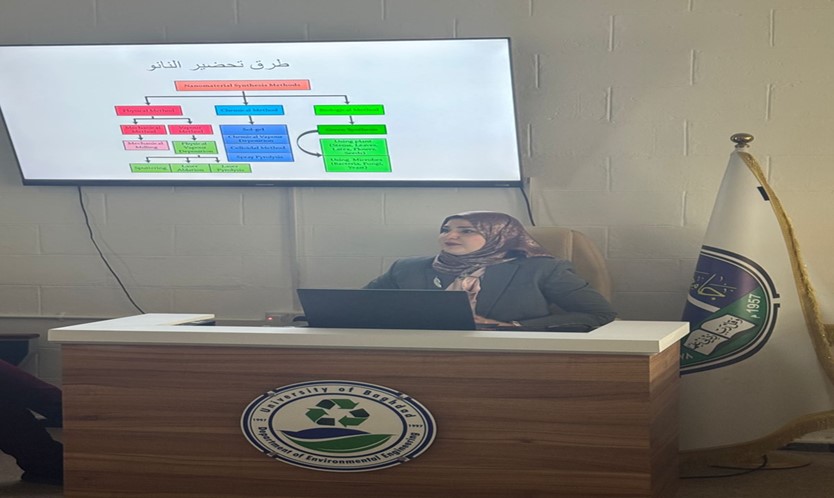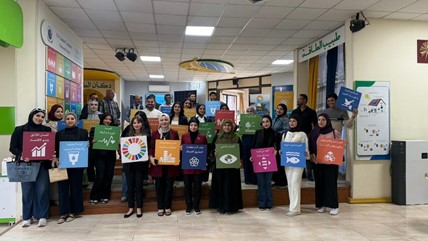Environmental Engineering
The Department of Environmental Engineering for Postgraduate Studies was created and formed as an independent department affiliated to the College of Engineering at the University of Baghdad in 1997 after it was tacitly and administratively linked to the Department of Civil Engineering since 1986. Since then, approximately 210 students from both genders have graduated with master’s and doctoral degrees in environmental engineering.
In 2005, undergraduate study was introduced in the Department of Environmental Engineering and a bachelor’s degree was awarded in environmental engineering. Comprehensive courses were developed to cover the theoretical and practical aspects in the various fields of the environment.
Vision:
The Department of Environmental Engineering aims to take a prominent position in advancing education, scientific inquiry, and community outreach within the realm of environmental engineering. The department has a crucial role as a model of excellence in delivering top-notch education with both local and global support. The department keeps abreast of changing times by providing an interactive academic atmosphere to promote interaction among students and faculty for creating an optimal learning environment.
Mission:
The Department of Environmental Engineering endeavours to provide leading and current instruction to equip graduates with the skills to identify, assess, and rectify intricate and intricate concerns in the environmental engineering arena. Additionally, it seeks to advance and implement essential and practical research that concentrates on devising and enacting feasible, effective, and sustainable engineering resolutions for actual environmental predicaments. Furthermore, the Department of Environmental Engineering strives to cultivate adaptable, internationally-focused, and interdisciplinary proficiency, and act as a proficient intermediary engaging with governmental bodies, businesses, and various local, national, and global organisations to establish enduring ecological remedies.
Objectives
The Department of Environmental Engineering endeavours to accomplish the subsequent goals:
- Establish, disseminate and integrate knowledge in the fields of engineering, sciences, and technology to expand the knowledge base in environmental engineering, thereby enhancing society.
- Improve the practice of environmental engineering by developing and transferring innovative applications of engineering, sciences and technology.
- Become recognized by peers as effective leaders in multidisciplinary research and develop novel approaches to solving environmental engineering problems.
- Attract and welcome undergraduate students to the Environmental Engineering programmed who champion innovative solutions, become leaders in their organizations, and possess the expertise and abilities needed for diverse roles and career transitions.
- Attract and recruit graduates and postgraduates who possess expertise and diversity in their respective fields of study. Leverage their academic prowess and leadership abilities to make significant contributions to both academia and industry.
- Cultivate a conducive learning environment that encourages and empowers students, faculty, and staff to strive for excellence while embracing a diverse community.
- Highlighting the importance of scientific research and its leadership in addressing the community’s issues through applied research is critical.
Additionally, it is vital to constantly design study programs and educational plans at all levels within the department to stay current with current developments in environmental engineering.
- Admission inputs
- Admission requirements for high-school practical branch
- Admission requirements for top students from other departments
- Learning Outputs:
The student will obtain during their study numerous skills such as:
- The ability to apply knowledge gained in mathematics, science and engineering.
- The ability to design and conduct experiments, analyse and interpret data.
- The ability to design a system, component, or process to address sustainable constraints.
- Ability to work in multidisciplinary teams to analyse and solve problems.
- Ability to identify, formulate, and solve engineering problems.
- Understand the effects of environmental engineering in a professional and ethical manner.
- The ability to communicate effectively in a variety of ways.
- The broad education necessary to understand the impact of engineering solutions on society and the surrounding environment.
- An understanding of modern engineering tools and knowledge is department’s foundation of learning.
- Knowledge of contemporary issues, which is the most important part of studying environmental engineering, because environmental problems pose a great danger to society.
- The ability to use modern engineering techniques, skills and tools necessary to practice environmental engineering such as treatment plant design, industrial and hazardous waste management, ..etc.
Head of Department
Department Coordinator
Examination Committee
Distribution of undergraduate students by academic level
The distribution of male and female undergraduate students














